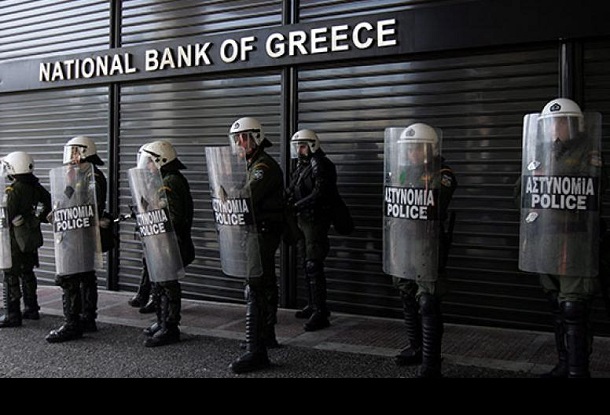21st Century Wire asks…
What else will Greece face in the wake of Troika’s financial reform package?
As a bailout deal has been struck, there are serious implications ahead for the people of Greece, some of which was recently pointed out by Zero Hedge:
“Yes, Greek banks may have been insolvent – something that was clear since the first bailout of 2010 –but at least the Greek state had control over them: as such it could have mandated mergers, recapitalizations, liquidity injections, even depositor bail-ins (perhaps the harshest lesson for the ordinary Greek population as a result of this latest crisis is that deposits are not “cash in the bank” but liabilities of insolvent financial organizations).”
The article continues linking to a Reuters piece that reveals the dark reality agreed to by PM Alexis Tsipras, perhaps exposing his true role all along:
“One of the preconditions imposed on Greece for a deal is that it signs into law European rules that would put euro zone authorities at the ECB and in Brussels, rather than Athens, in charge of identifying and closing or breaking up sick banks.
This in turn could lead to a shake-up of the sector that could see some banks close, with losses pushed onto bondholders and possibly even large depositors. In such circumstances, there would be little that Athens could do to prevent this.”
With Greece having its third bailout in five years, the hopes of leaving the eurozone are all but shattered at the moment, as they face a worse financial situation – one which could see more social upheaval and political divide in the near future.
Even the BBC acknowledges that the new bailout for Greece will be a brutal process:
“Greek Prime Minister Alexis Tsipras will have to rush key measures on pension reforms, tax increases and a debt repayment fund through parliament. It will be a bruising process. Only then will bridging loans be released that will enable Greece to meet a payment to the European Central Bank next Monday.”
In a telling report from Tovima, we learn that, “According to recent surveys conducted by Greek statistics authority ELSTAT on the income and living conditions, the Greek people appear to be disappointed with life and work, as 4 in 10 are unhappy with life, finances, work and their living environment. This rate increases to 6 out of 10 for people whose income is near or under the poverty line.”
Below Global Research expands on the many consequences of this latest Greek bailout…

‘Blood Money’ – Greece seems set to incur a serious recession with another banker bailout.
Prime Minister Tsipras’ Bailout Reform Package: An Act of Treason against the Greek People
Prof Michel Chossudovsky
Global Research
After having launched a Referendum to refute and refuse the debt bailout agreement put together by the Troika, Prime Minister Tsipras together with his newly instated Finance Minister, comes up four days latter with an austerity package broadly similar to the one which was turned down by the Greek government in June.
This about-turn had been carefully engineered. The Greek people were misled and deceived. The Referendum was an outright ”ritual of democracy”.
Tsipras had made a deal with the creditors. He was in favor of accepting the demands of the creditors all along.
Tsipras led the “NO” campaign while having already decided that in the wake of the Referendum, he would say YES to the creditors and cave in to their demands. This is tantamount to an Act of Treason.
 There was no attempt by the Tsipras government in the immediate wake of the Referendum to renegotiate or extend the deadline on behalf of the Greek people in response to the NO Vote.
There was no attempt by the Tsipras government in the immediate wake of the Referendum to renegotiate or extend the deadline on behalf of the Greek people in response to the NO Vote.
On Monday morning, the day following the Referendum, Yanis Varoufakis who had led the negotiations with the Troika resigned as Finance minister. Did he wilfully resign or was he “dismissed” to facilitate an agreement with the Troika?
Creditors are known to influence appointments to key ministerial positions.(e.g. South Korea, December 1997 at the height of the Asian Crisis, the Finance minister and the Head of the Central Bank are dismissed on the orders of Washington).
Varoufakis was hastily replaced by Euclid Tsakalotos, who took office on Monday morning. His appointment as Finance Minister and chief negotiator (which must have been known well in advance) was broadly welcomed by the EU political and financial establishment.
Prime Minister Alexis Tsipras together with his new finance minister then held meetings throughout Monday both with Syriza and the opposition. And by the end of the day, a “joint statement” was speedily signed “by almost the entire political spectrum backing his efforts to seek a new deal from the country’s creditors.”

‘Trojan Horse’ – The crisis in Greece has only just begun. (Photo link financialpost.com)
Tsipras later told Parliament that his government had been forced to cave in to the demands of the creditors. He also said that the referendum did not authorise the government to envisage the Grexit, namely an exit from the eurozone.
What he failed to mention is that the NO Vote gave him a political mandate to renegotiate the deal on behalf of the Greek people with a view to at least alleviating the deadly impacts of the proposed austerity measures.
By Thursday, a document of 13-pages containing concrete reforms and austerity measures was sent to the Troika. The initiative was intended, according to media reports ”to act as a foundation to free up a new three-year, 53.5-billion euro bailout package to save the nation from bankruptcy”.
These proposals outlined in the 13 page document spell disaster for Greece
They involve massive tax hikes, a drastic reduction in public sector wages, cuts in pensions including an increase in the retirement age to 67, the privatization of state assets including public utilities and infrastructure: “The government will look at selling off state assets and will get the ball rolling on privatizing the electricity grid company, regional airports and ports including Pireaus and Thessaloniki.”
Neoliberalism and deadly “economic medicine” carried out by a Leftist Party. Below are some of the highlights of these proposals: (emphasis added)
The proposals include a slew of tax hikes including a 23 per cent value added tax on restaurants and catering, a reduced 13 per cent tax on basic foodstuffs, energy hotels and water and a so-called “super reduced” rate of 6 per cent on such things as pharmaceuticals, books and theatre — perhaps appropriate for a country that pioneered drama. The new tax levels will kick into gear this October. [These tax hikes will kill the Tourist industry and trigger bankruptcies of local restaurants and hotels]
Moreover, special tax breaks for the country’s islands — popular tourist magnets — will be scrapped. Only the most remote islands will get to keep the coveted tax breaks.
Military spending will be slashed by 100 million euros this year and double that in 2016.Corporate tax will increase from 26 to 28 per cent and farmers will lose preferential tax treatment and fuel subsidies. [This will trigger bankruptcy of farmers]
The government is looking at reforms that would bring permanent savings of 1/4- 1/2 per cent of gross domestic product in 2015 and 1 per cent of GDP in 2016 and beyond.Measures aimed at achieving those numbers include discouraging early retirement and standardizing the retirement age to 67 by 2022 — except for those performing “arduous jobs” and mothers raising kids with a disability. [delaying retirement also contributes to increasing youth unemployment]
Social pensions will be better targeted, while supplementary pension funds will be financed by employees’ own contributions. Perks such as a solidarity fund will be gradually phased out and health contributions for pensioners will jump from 4 to 6 per cent on average. More reforms will kick in to make the pension system more sustainable, including an overhaul of pension contributions for all self-employed. [Drastic reduction in social benefits will trigger mass poverty]
Authorities will shape up public sector wages to ensure that they’re on a downward trajectory by 2019 and that they fit “the skill, performance and responsibility” of staff {Destruction of the public sector]
…
Amendments on insolvency laws will aim to get debtors to pay up loans, while consultants will help on how to deal with bad loans. Steps will also be taken get foreign investors to pour their money into Greek banks.
The government will open restricted professions such as engineers, notaries and court bailiffs. It will draw up laws aimed at getting rid of red tape and making it easier to get business licenses, while reforming the gas market.
The government will look at selling off state assets and will get the ball rolling on privatizing the electricity grid company, regional airports and ports including Pireaus and Thessaloniki.[ A piece of cake for foreign investors, who will acquire the country’s public utilities and infrastructure]
What is not explicitly mentioned in the 13 page document is the logic of “vulture investment”, leading to the eventual demise of “Greek capitalism” including its banking and commercial shipping industry.
(The essential elements of both the joint statement and the 13 page document were no doubt drafted prior to the Referendum).
Who are the Main Actors?
The Troika is acting on behalf of the creditor institutions. They do not call the shots. The ECB is integrated by individuals who are in close liaison with major banking interests including JP Morgan Chase, Deutsche Bank and Goldman Sachs.
Similarly, the Washington based IMF (which essentially is a debt collecting bureaucracy) is part of what is called the Washington consensus, with links to the US Treasury, Washington’s economic think tanks and of course Wall Street.
More from Global Research…
READ MORE ON THE GREEK SITUATION: 21st Century Wire Greece Files















